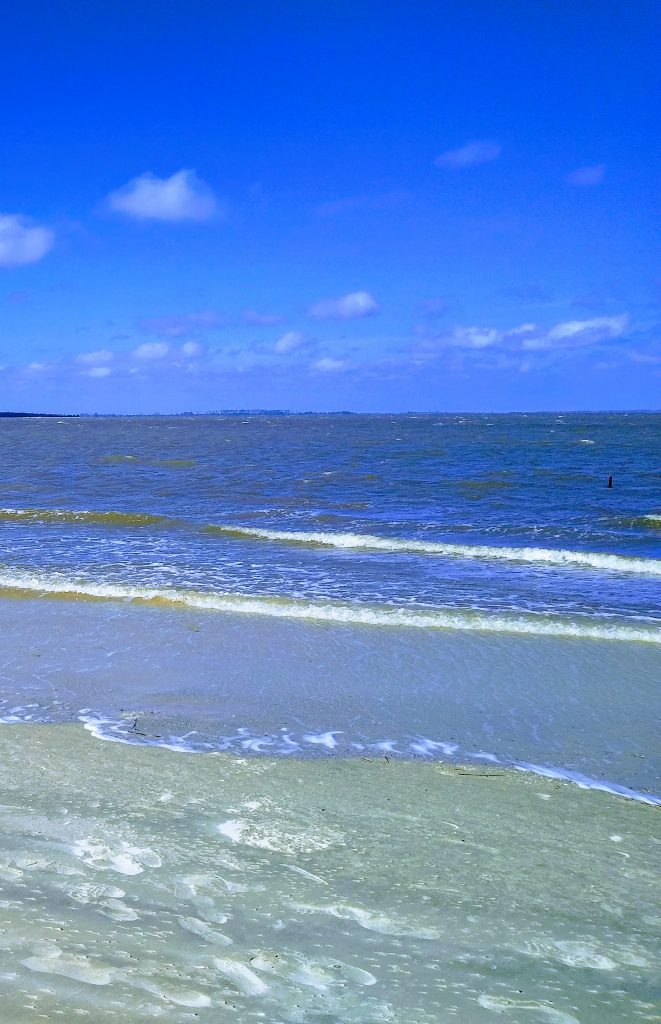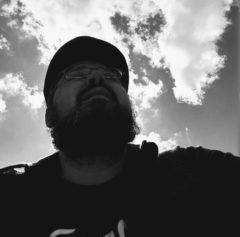
The waves came in and out and in, in and out and in, then in, out, and back out, and then in again; the many books came with them. Though he was the only one on the island, stranded, with just a survival knife and the pants he wore when he was thrown overboard; though he had not seen a single ship since he woke on this deserted beach; still, he kept the books that washed up on the shore hidden away in a cave, the cave tucked back under the cliffs on the other side of the island. The books washed up on shore, almost daily, in glass bottles, large and rectangular, or large and cylindrical, each one just large enough to contain the book it held. He smashed the bottles in an out of the way corner of the beach, using coconuts, laid the books out on the beach to dry. They were invariably damp because while all of the bottles were well-corked, none were perfectly sealed.
At first, he would read them. It was a way to attack the boredom of seemingly endless sunrise and sunset. Coconuts for breakfast, coconuts for lunch, coconuts for dinner. Maybe a wild hog on Christmas, if he had the energy, but that was only twice a year. He kept a perfect talley of the days on a coconut tree near his shelter, and it was maybe three years into his exile before he realized he could celebrate Christmas twice a year if he wanted. So he did. The weather was hot and windy. Rain was prevalent in certain seasons, unpredictable from day to day, but in larger patterns it was mostly unchanging. There was no winter, so it didn’t matter when Christmas fell. So, now, it fell twice a year for him, and incidentally, neither was in what would have been December. But without boughs of holly, lights, egg nog, and presents, he had to redefine what Christmas meant. He even changed the name to Thanksgiving.
Beyond Thanksgiving, the books were the way he kept busy. He had explored the island, but it was not very big. One side was beach, the other was cliffs, and in between a tropical wood thick with vines and trees, wild birds and hogs, and a trickle of a fresh water stream coming down the cliffs. It did not take a full year to map it all in his head. So he busied himself with books. That and pulling on his beard. He had never worn a beard before, but now he had no choice, however he was still not used to it, he couldn’t keep his hands out of it. Of course, as the books washed up on shore at an almost daily rate – .68 books per day since he began tracking – he couldn’t read them all, so he catalogued when they had washed up (on the trunk of a coconut tree) and kept them hidden in the cave. At first, he stacked them against the walls, until, he realized, miraculously, the walls in the back of the cave had eroded over time to create natural shelves. Soon, he had quite the secret library with more books than he would likely live to read.
It was not long after this time – the time when he realized he would not live long enough to read them all – that he stopped reading them all together. What’s more, the natural shelves in the back of the cave had been filled. He had just finished Christmas dinner, was sitting by the fire. He was in the middle of a long chapter of a long novel, when he stopped, closed the book, and decided he would not finish it. It had nothing to do with the novel, it was a great novel. A classic. Still, he put it down, picked up a dry tree limb he had piled for fuel, ripped off one of his pants legs, wrapped it around the limb. He dipped it in coconut oil and lit it like a torch.
He went to the cave, moving slowly through the dark.
Once inside, he perused the shelves by torchlight, looking for the book he knew was there – a book he remembered washing up maybe the week before. The surf echoed against the walls of the cave, creating a cacophony, and in that noise, under that noise, he thought he made out human voices, attempting to convey significance. He found the book, left the cave, returned to his fire. He built it back up and stared at it. The book was an illustrated history of boat building. He finished his cup of coconut milk, went back to his shelter for the night.
The next morning, he woke and began working. He had the single knife, which he sharpened using stones. Having an endless supply of wood and plenty of stone, he first fashioned tools. Then, using the tools and the knife, he began carving up downed trees, carving long planks from the wood, using the shapes they already had as much as he could but that they would still serve their intended purpose. He worked long days, often into the night, by the light of the fire. He fashioned a twine from vines he cut from the thicks of trees which made much of the island impenetrable. The twine he would use to tie the planks together. He finished the planks with coconut oil, hauled it all on his back to the other side of the island.
It was Christmas Eve again by the time he had the new shelves built to line the walls of the caves. Finished, he hunted a wild boar and spit-roasted it over the fire that evening in celebration. He drank a fermented coconut drink he had made, which was more a yogurt than a drink, but it eased his thoughts, distracted him from the soreness of his limbs, the pinch in his spine. He felt good as he sat under a giant coconut moon, milk-colored. The moon, he thought, was grinning at him. That’s when he realized that since he had quit reading, the books quit washing up on the shore.
He rose, went to his shelter and found the novel he had stopped reading, brought it back to the fire. He had marked the place he left off at in the book with a leaf, found that place and began reading. But he was tired. He read part of the same paragraph over a few times. Finally, he shut the book.
He had marked the place he left off at in the book with a leaf, found that place and began reading, but he was tired. He read part of the same paragraph over a few times. Finally, he shut the book – threw it on the fire.
He shut his eyes.
The night was clear and warm, so he slept by the fire. When he woke in the morning, the fire was out, and he looked in it at the blackened ashes of the book. Beyond the burned out fire, beyond the beach, beyond the sea, he regarded a sunrise that set fire to the world in a way he had never seen before.
Many years passed. He quit handling his beard, but it had grown so long, he could see it was entirely gray now without having to pull at it. He barely had to look down. He was sitting on the beach the morning the final book washed up on shore. It was the first in years and would be the last for years to come, the last one ever as far as he knew.
He rose, pulled the book from the water, returned to his place on the beach. He didn’t bother to free the book from its bottle, he didn’t even intentionally read the title, but he couldn’t help it: Marooned: How To Survive On A Desert Island, By Everett E. Mann.
He looked back at the sunrise, how it set fire to the world in a way he had never seen before. He did not think about the book on building boats and how it had only come to him after he decided to stay on the island. He did not think about this book, and how it had only come to him after he decided to die. Instead, he looked at the sunrise, lay back, put the book in the bottle on the middle of his chest, enjoying the feel of its weight. He shut his eyes to rest, made do with what he had.
